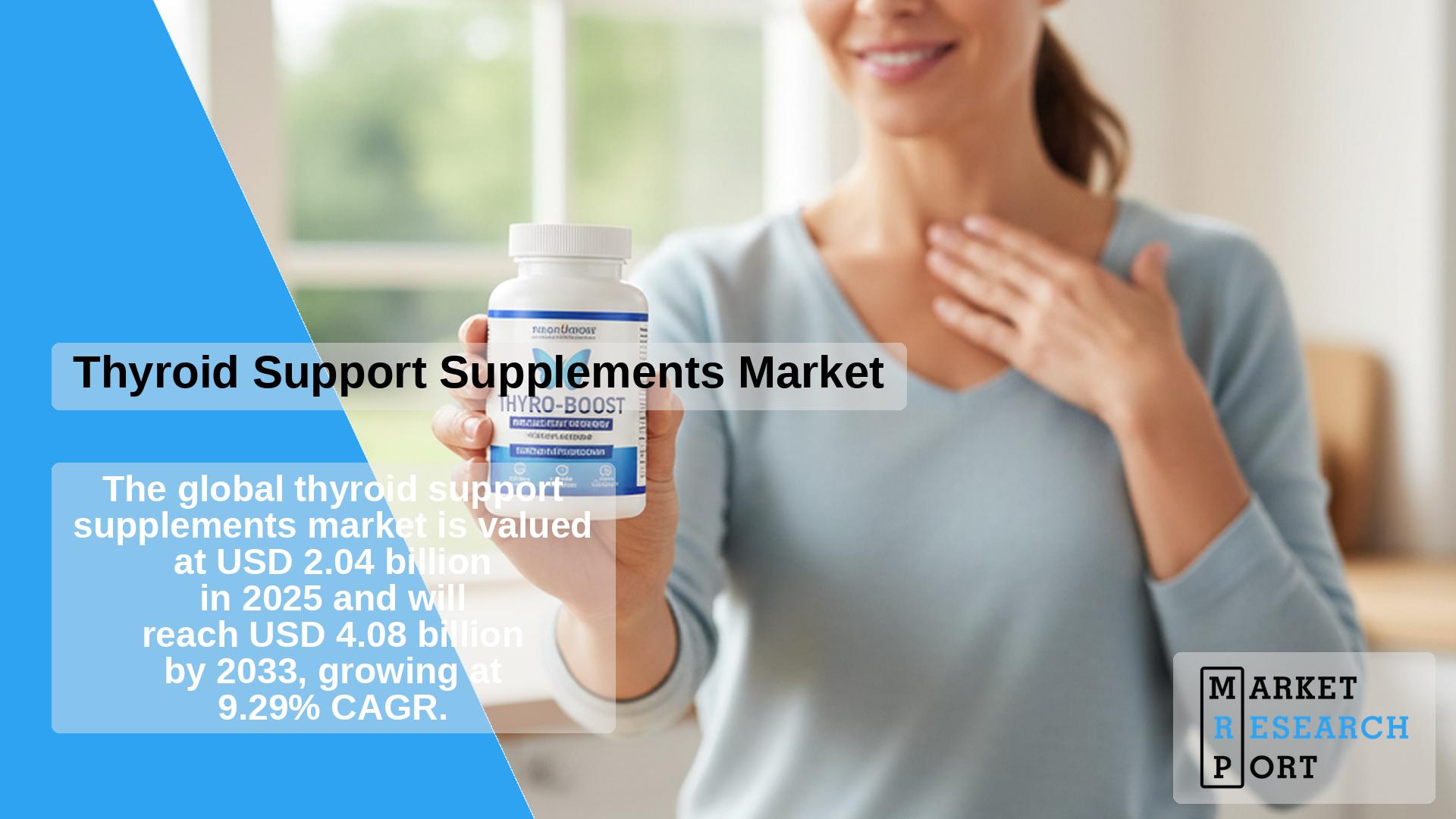
The global market for thyroid support supplements was valued at approximately USD 2.00 billion in 2025 and is anticipated to grow to USD 4.08 billion by 2033, reflecting a compound annual growth rate (CAGR) of about 9.29% between 2025 and 2033. Consumer interest is increasingly focused on natural and herbal supplements containing ingredients like iodine, selenium, zinc, ashwagandha, and vitamin B12 to support thyroid function and metabolic balance.
The rising prevalence of thyroid disorders such as hypothyroidism, hyperthyroidism, and autoimmune conditions is a strong catalyst for the market. These conditions often require long-term management, leading to sustained demand for thyroid support supplements. Women are particularly susceptible, and natural, herbal formulas offering a sense of safety and holistic benefits are gaining popularity.
Lifestyle factors including stress, poor diet, and sedentary habits contribute to thyroid dysfunction, further driving supplement uptake. Increasing preventive healthcare and wellness trends bolster continued market growth globally.
The market exhibits moderate innovation, with emerging formulations combining vitamins, minerals, and herbal extracts aimed at enhancing thyroid health with minimal side effects. Clean-label, bioavailable, and plant-based products are increasingly preferred. For example, ThyroLove, launched by Inna Topiler in 2025, features 26 clinically studied nutrients targeting hypothyroidism and Hashimoto’s disease.
Mergers and acquisitions occur moderately, with larger firms acquiring nutraceutical companies to expand portfolios and geographic reach. Regulatory frameworks including FDA and EFSA guidelines ensure product safety and quality, encouraging trust and innovation.
Tablets remain the most popular product format due to their accessibility and consumer familiarity, while capsules are growing rapidly thanks to their superior absorption and suitability for herbal blends.
Vitamins and minerals such as iodine, selenium, zinc, and vitamin B12 represent the major ingredient segment due to their critical role in thyroid hormone synthesis and regulation. Herbal extracts constitute the fastest-growing segment, with increasing consumer preference for natural, plant-based health solutions.
Pharmacies and drug stores remain primary retailing points, trusted for product authenticity and accessibility. Online retail channels are rapidly expanding driven by convenience, wide selection, and e-commerce growth.
Adults comprise the largest end-use group, reflecting high prevalence of thyroid imbalances in working-age populations. The geriatric segment is projected to grow fastest due to age-related thyroid dysfunction and increased supplement usage among older individuals.
| Attribute | Information |
|---|---|
| Market Size (2025) | USD 2.00 billion |
| Forecast Revenue (2033) | USD 4.08 billion |
| CAGR (2025–2033) | 9.29% |
| Historical Data | 2021–2023 |
| Forecast Period | 2025–2033 |
| Segments Covered | Product Type, Ingredient, Distribution Channel, End Use, Region |
| Regions Included | North America, Europe, Asia Pacific, Latin America, Middle East & Africa |
| Countries Covered | U.S., Canada, Mexico, UK, Germany, France, Italy, Spain, Denmark, Sweden, Norway, India, China, Japan, Australia, South Korea, Thailand, Brazil, Argentina, Saudi Arabia, UAE, South Africa, Kuwait |
What is the current size of the thyroid support supplements market?
In 2025, the market size was approximately USD 2.00 billion.
What is the forecast growth rate?
The market is expected to grow at a CAGR of 9.29% through 2033.
Which region holds the largest market share?
North America leads, with over a third of the global market.
What product types dominate the market?
Tablets are most common, with capsules growing rapidly.
What ingredients are key in thyroid support supplements?
Vitamins and minerals such as iodine, selenium, and zinc dominate, while herbal extracts are the fastest-growing segment.
What are major distribution channels?
Pharmacies/drug stores lead, with online sales growing due to convenience and selection.
Who are the leading manufacturers?
Top players include NOW Foods, Abbott Laboratories, GNC, Thorne Research, and Nestlé.